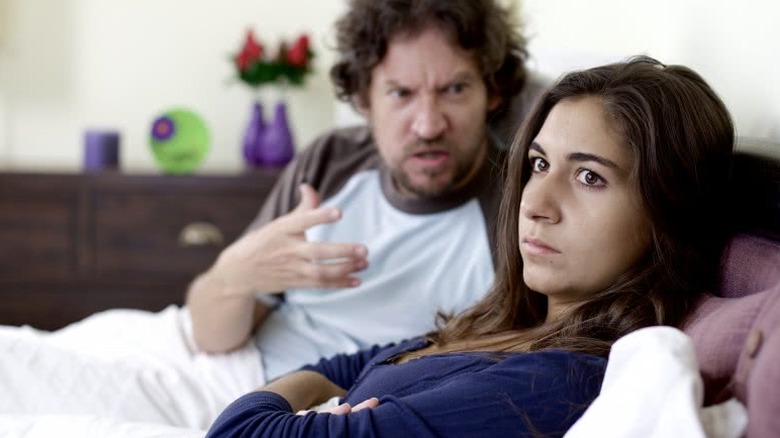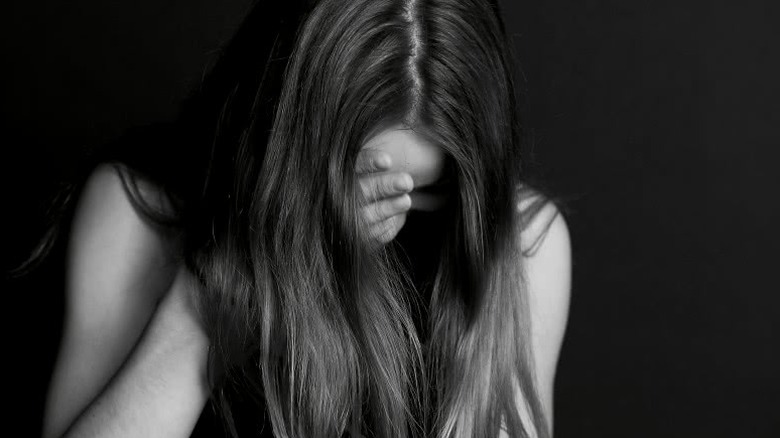How To Know If You're In An Emotionally Abusive Relationship
We may receive a commission on purchases made from links.
All relationships have problems, but abuse is not something anyone should have to put up with in a relationship. The National Coalition Against Domestic Violence reports on their domestic violence fact sheets that almost 20 people are physically abused by a partner every single minute. Nationally, domestic violence hotlines across the country get about 20,800 calls every day. The numbers are staggering, and it's very disturbing to think about all the people who live in an abusive relationship because they don't feel they can get out, are afraid or too depressed to leave.
Elise Lopez, researcher in sexual and domestic violence at The University of Arizona, says, "Relationship abuse isn't always physical. Emotional abuse can be hard to spot because it encompasses many behaviors, like excessive jealousy, that we've been socially conditioned to think are normal signs of love and affection." You might not even know you're in an abusive or dysfunctional relationship, but you may feel like something is wrong. You may feel sad, scared, confused or angry and not know why. Oftentimes when people feel like this, it is because they are paired with an abusive partner, or at the very least being subjected to abusive treatment.
Here are some things that denote an abusive relationship. If you experience any of these things, please seek help. You don't deserve to be mistreated.
You've asked for nicer words, but your partner won't listen
Nobody likes mean, loud or angry words. You don't want to be talked to harshly. And you've told your partner that. But it doesn't make any difference. Dr. Helen Odessky, clinical psychologist and author, told me that when your partner uses language that is hurtful to you and you've already let them know, yet they won't stop — it's abuse.
Katie Kozlowski, a self love and relationship coach with expertise in the areas of abuse and trauma, says, "If there are verbal patterns or phrases that make you feel afraid, hurt, silence or shameful, chances are there is some emotional and verbal abuse going on and you have the right to speak up or get out of the relationship." But what if you do speak up, and nothing changes?
April Masini, relationship and etiquette expert and author, says, "Emotional abuse requires a victim, and if you don't allow yourself to play that role, you're gong to be able to get out of the pattern of abuse." But Masini says that you have to follow through with refusing to stick around if your partner won't stop the verbal abuse. She says you can do so by "actively and deliberately foster relationships with people who are not abusive. Replace any abusive relationships with healthy ones." Joining a support group, or seeing a therapist will help you make these positive changes in your life.
You find yourself getting gaslighted
One thing that manipulative people do is gas lighting. Dr. Ben Michaelis, clinical psychologist and creator of a website dedicated to helping reduce the stigma of mental illness, told me, "This is a tactic where the abuser causes the victim to question his or her reality by denying that he or she said or did something that he obviously did. It is a subtle form of abuse that can seriously impact the confidence and mental well being of the person who is being abused."
Christine Louis de Canonville, psychotherapist and holistic healer, told me that this tactic is "similar to those used in brainwashing, interrogation and torture that have been used as psychological warfare by intelligence operative, law enforcement and other forces for decades." Stephanie Nilva, executive director of Day One, a nonprofit that works with young people experiencing dating abuse and domestic violence, told me that abusers even use technology to gaslight their partners.
But how do you know you're being gaslighted? Dr. Susan J. Elliott, JD, M.Ed., tells of her own experience with gaslighting in on her website, and says you can identify this behavior with the feelings it evokes in you. If you second guess yourself a lot, feel confused, feel like you have to be on "high alert" all the time or if you apologize even when you know something is not your fault, there is a chance that your partner is gaslighting you. Dr. Elliott says that the abuse isn't likely to stop — the abuser will continue to treat you this way. She advises you go get out, and avoid all contact.
You never get to do what you want to do
You want to watch TV. He wants to go out. That's a pretty common relationship problem, except when the solution always leans in his favor. Dr. Gary Brown, a West Los Angeles-based psychotherapist, told me that when "you find yourself doing what they want almost all of the time, and feel manipulated, like a puppet on a string," it's a top five sign that your relationship is toxic.
Amanda Berry, a licensed marriage and family therapist out of Chicagoland, told me that this type of abuse comes down to intimidation. She says that if you "feel like you MUST do a certain thing or you're going to have to deal with major consequences (that, let's face it, don't generally fit your crime)" then you're paired with an emotional abuser who uses intimidation tactics to get what they want.
This is an especially acute problem when your partner doesn't want you to do things that are essential to your mental, emotional, or financial well-being. Many experts talk about abusive partners who won't "allow" their partners to work, either because of jealousy or a issue of sheer control. This is a big red flag, and you should seek counseling right away.
You feel out of the loop financially
Dr. Odessky, licensed clinical psychologist and author, told me, "If you do not have access to finances or financial information, you may be in an emotionally abusive relationship."
Jef Henniger, Esq., a divorce attorney based in New Jersey who interacts with people in abusive relationships almost every day, told me, "one of the most common tactics that abusers employ but that people rarely talk about is control using finances. I talk to many clients that don't know how much their spouse makes, how much money is in the bank account, or even whether they got a tax refund! They are totally in the dark. They don't even know what bank the money is in! They get a small allowance, like a child, every week. This makes them completely dependent on the other spouse and often prevents them from even hiring an attorney to help them."
The National Domestic Hotline published an article about this topic, highlighting the fact that money is often a stressor in a relationship, but that in abusive relationships, it becomes an area for the abusive partner to extend control. They say signs of financial abuse include giving an allowance, demanding receipts for even the smallest of purchases, taking the partner's pay check and depositing into an account that the earner can't access, and preventing the partner access to financial information, among many other signs. If you find yourself in this situation, speak to someone right away. In addition to your mental, physical and emotional health, your financial health is important as well.
You feel hopeless or worthless
If you have terrible self esteem and blame yourself for your partner's treatment of you, you are in a bad situation. Audrey Hope, a renowned relationship expert, told me, "Low self-esteem is almost always a trait of someone who is abused. The first place they go and land is into their own faults and weaknesses. They think the behavior of the other person is because they are making them mistreat them. They are the ones who need to change or else the abuse would not happen."
Marni Feuerman, licensed marriage and family therapist in Boca Raton, Florida, told me, "All abuse takes a severe toll on self-esteem. The abused person starts feeling helpless and possibly even hopeless. In addition, most mental abusers are adept at convincing the victim that the abuse is his/her fault. Somehow, the victim is responsible for what happened."
This is a little different from gaslighting, when someone tries to tell you that what you've heard or what you've seen or felt isn't real. In this situation, you go ahead and take the blame for the abuse because, somehow, you feel that you deserve it. Ellen Champion, head of Champion Relationship Coaching, told me that you know you're in an abusive relationship when "you realize that your self-esteem has worsened due to the way your partner treats you." Self esteem problems can be debilitating, and when you feel hopeless or worthless, you should seek help immediately.
You spend all your time in a fantasy world
You daydream all the time. You avoid reality. You bury yourself in movies, TV, books, video games, booze or drugs — you spend all your time escaping. Why? It could be because you're in an abusive relationship. Audrey Hope, relationship expert, told me that big markers of abusive relationships are avoidance, denial and distraction. She says, "you spend more time alone and in your own fantasy world where everything is safe and fine. You need to stay in your own 'movie,' away from people. This means that you spend a lot of time with yourself in your pretend world."
We will often try to escape when we're in an unbearable situation. Even if you aren't using drugs or alcohol to escape, if you're not present in your real life, and you spend all your time in a fantasy world, ask yourself if it's because your actual reality is too hard to face. If it is, it is high time to change that.
You're ashamed of your libido
If you seek intimacy with your partner, and he or she withholds it or makes you feel guilty or wrong, it can be a sign of abuse. Dr. Kathy McMahon, clinical psychologist and president of Couples Therapy Inc., told me, "emotional abuse is an investment in control and domination." Therefore, if you have a partner who withholds sex for no reason you can discern, it could be because he or she is exerting control and dominance on you by not engaging with you physically. So many people think that abusive relationships consist only of a sexually aggressive mate, or even relationship rape, but often times it goes the other way — where the abused wants a healthy sexual relationship and the abuser withholds affection and makes the abused feel wrong, dirty or ashamed.
In other cases, sex addiction can be involved on one side or the other. We're not saying you're a sex addict, but that doesn't mean your partner doesn't try to paint you as one. And, if you've gone to couples therapy about it, odds are your therapist wasn't fair to you. Dr. McMahon says, "sex addiction treatment at the hands of some therapists can actually empower the emotionally abusive spouse, setting no limits on how they speak to the sex addict (or alleged sex addict). Simultaneously, they also restrict and structure how the addict responds to these attacks: supportively. This iatrogenic emotional abuse by proxy is one of the scariest aspects of this phenomenon." Imagine, if you will, that the "addict" in question isn't an addict at all, but a partner who is accused of sex addiction by their partner as a means of control? Make sure you find a therapist who can accurately identify addiction (so you're not unfairly pigeonholed).
You're ashamed that you don't have much libido
If you're suffering from emotional, mental, physical or verbal abuse, odds are you don't feel like getting frisky. Lots of other things can impact our libido, like worry about money, work stress, family drama and just plain exhaustion, but if you consistently don't want to have sex with your mate, there might be a more sinister reason for it. And, if you don't and your partner belittles you or shames you, that's abuse and you can't afford to let it continue.
But back up a minute. Maybe you started out wanting to be physical, but over time things have changed. Perhaps your mate is sexually manipulative in a way that makes you uncomfortable. Dr. Fran Walfish, Beverly Hills family and relationship psychotherapist, author of The Self-Aware Parent, and co-star on Sex Box on WE tv, told me, "The abusive partner emotionally manipulates you into sexual activities you don't like. They may even emotionally arm-twist you by saying things like 'Other guys/girls do it, why can't you?'"
Kimberly Hershenson, LMSW, told me that abusers can be selfish when it comes to sex, and that "not having your needs met sexually may be a sign to end the relationship." If you don't want to have sex with your partner anymore because of their sexual behavior, try talking it out, but see a therapist if you suspect you're in an abusive relationship.
You feel digitally policed
Most people keep their email, social media account and other internet passwords to themselves. That's the whole part of having a password, right? In some cases, you might share accounts or share passwords, but the key word there is share. If your partner is constantly trying to access your accounts, or is policing what you post on social media, you could be a victim of technological abuse.
Stephanie Nilva, executive director of Day One in New York, a nonprofit that works with young people who experience dating abuse or domestic violence, told me, "These days, technological abuse is a powerful form of emotional abuse. Day One sees clients who are being stalked online and feel their abusive partner knows their every move."
Even if you don't feel like you're being stalked, if you feel like you're being monitored, that just isn't right. Jor-El Caraballo, LMHC, a licensed therapist in New York City, told me, "One of the ways I see emotionally abusive partners exert control these days is by controlling what a partner can do, or say, online. This kind of behavior includes demanding to have all your social media passwords, limiting what images they post on Snapchat or Instagram, and even dictating who you're allowed to follow or be friends with." Caraballo says that this type of jealousy and control can be a big red flag for emotional abuse. Bottom line? If you feel like someone is trying to control your online freedom, or any other type of freedom, it's time to get help.
You hear I love you, but a lot
Everyone loves to hear "I love you." However, when the sentiment is followed with a "but..." you are in for a hit to your self-esteem. Mari Feuerman, licensed marriage and family therapist, told me, "That might sound nice at first, yet is both disguised criticism and a threat. It indicated, I love you now, but if you don't stop this or that, my love will be taken away. It is a constant jab that slowly strips away your self-esteem. Abusers get a lot of reinforcement out of using the word love as it seems to be a magic word to control you."
Real love does't have conditions. And, while the person who loves you might not love everything about you, they should never say "I love you, but...." Feuerman also says, "Abusers at times do what I call throwing a bone. I have heard countless times from clients that their partner was nice, complimentary, gave me a gift, etc. as if that should erase all of the bad treatment. You need to understand that this is part of the dynamic and cycle of abuse." You deserve someone who simply loves you with no conditions.
You're afraid they might hurt you
Even if your significant other doesn't actually come out and threaten to hurt you, you could still be afraid they might. Dr. Gary Brown, psychotherapist of 30 years, told me, "Here is my number one tip [to know] that you are in an abusive relationship. You constantly feel that you are walking on eggshells whenever you are around this person.... You feel afraid around them." Your partner might threaten you. Dr. Brown says, "threats can come in the form of physical abuse (or the threat of physical abuse), threatening divorce or breakup, denying access to loved ones and vows to find other ways to punish you."
Julienne Derichs, LCPC who works with couples in a private counseling practice, told me that being afraid is one of the biggest indicators that you're in an abusive relationship. She told me, "Emotional abuse is the manipulation of emotions for the purpose of gaining control over another person. The aim of emotional abuse is to slowly eat away at a person's feelings of self-worth and independence. In an emotionally abusive relationship, a person may feel that there is not way out of the relationship or that without their significant other they will have nothing."
Odds are, if you're in a relationship and actively afraid your partner might hurt you, a lot of things have already happened to get you to that point. Do not hesitate. Take whatever steps necessary to distance yourself from that person.
You deserve to be happy
Please seek help rather than try to figure things out on your own. Being in an unhappy relationship doesn't mean it's abusive, but it's important to remember that just because he or she doesn't hit you doesn't mean that it's not abuse. Listen to your heart, trust your instincts, and listen to your friends and family if they express concern. Be strong, be brave and do what's right for you. You deserve to be happy, healthy, and out of harm's way. If you or someone you love needs help to get out of an abusive relationship, a good first step is calling the National Domestic Violence Hotline.












